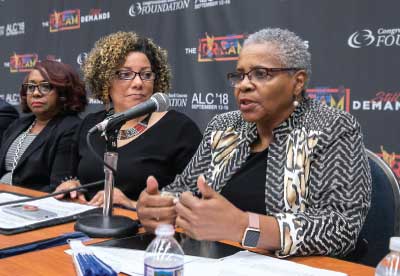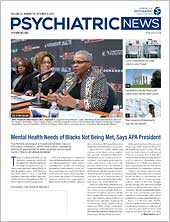There is a mental health crisis in the black community, which calls for improved cultural competency training for all psychiatrists, as well as more openness among blacks to talk about these issues, said APA President Altha Stewart, M.D., at the 48th legislative conference of the Congressional Black Caucus Foundation (CBCF), a black empowerment organization.
Cultural competency training is aimed at helping health care professionals understand patients’ values, beliefs, and behaviors, so they can customize treatment to meet patients’ social, cultural, and linguistic needs. For black Americans, this means educating clinicians about the impact of community stressors and how they contribute to their mental health problems, said panelists at the first CBCF panel devoted to mental health in the black community.
These stressors include violence and trauma, sexual abuse, racism, implicit bias, poverty, nutritional deficiency, and limited access to educational, recreational, and employment opportunities, said Stewart, who is also the director of the Center for Health in Justice Involved Youth at the University of Tennessee Health Science Center. “Just being a black person in America can keep you in a constant state of rage,” she said, quoting the late author and social critic James Baldwin.
There are only about 2,000 black psychiatrists nationwide, Stewart pointed out. “There are not enough black psychiatrists in America to serve all the black people who need mental health care.” She called for all psychiatrists to become more culturally competent and to encourage young people with an interest in STEM (science, technology, engineering, and mathematics) to enter the mental health field. “Medicine needs their voices. We need their presence.”
Although it has been 10 years since the passage of the mental health parity law mandating equal coverage of treatment for both physical and mental illnesses, too many have found their mental health benefits lacking, Stewart said. For instance, oftentimes when individuals try to find a psychiatrist, they cannot find one in their plan’s network that is accepting new patients.
“That is not parity,” Stewart said. “The people who make policy need to be advised that it is not working. Our voice collectively as a group, as a population, needs to be loud enough, strong enough, and informed enough to make people pay attention when we need help.” She encouraged individuals, too, to raise awareness with their employers and benefits office about problems accessing mental health care.
Patricia A. Newton, M.D., M.P.H., CEO and medical director of the Black Psychiatrists of America, told attendees that less than half of blacks with mental disorders get the care they need, and that number drops to one-quarter when blacks of Caribbean descent are taken into account. Compared with whites, blacks are more likely to use emergency rooms or primary care services rather than to visit mental health specialists.
Blacks, too, are more likely to be subjected to implicit—or unconscious—bias by clinicians, Newton added. “Very often, our people are misdiagnosed.” For example, blacks with depression are sometimes misdiagnosed with schizophrenia, and blacks who are grieving the loss of a loved one and say they’ve experienced a “visitation” have been misdiagnosed as psychotic, due to cultural and religious misunderstanding, she said. Moreover, blacks with psychosis are more likely to be hospitalized than to be referred for community treatment.
Newton called for increased funding for “the social determinants of mental health,” including housing, food, health care, and mental health education for primary school students.
Also, she said, “We have to make sure that people get referred for treatment rather than sent to jail.” She pointed out that the majority of prison inmates have a mental illness and are nonviolent and called for increasing the number of mental health courts and drug courts.
Stewart pointed out recent strides made in the most recent edition of the Diagnostic and Statistical Manual (DSM-5) so that it better incorporates patients’ cultural background into the treatment process. DSM-5 includes the cultural formulation interview, a set of questions psychiatrists may use to better understand the impact of an individual’s culture on clinical presentation and care. In addition, she said, “There’s a whole new area of discussion around the impact of trauma from childhood throughout the lifespan.”
Mental illness, suicide, and sexual abuse are seriously underreported among blacks, Stewart said, because these topics are taboo in churches, throughout the community, and even within families. “You can’t get an accurate reporting of what you’re not talking about,” she explained.
She encouraged black people to educate themselves about mental illness using reputable sources, openly discuss issues around mental health, and identify people in the community who need help.
“We have to dispel the myth that mental illness doesn’t happen to us in the black community, that it’s a ‘white folks’ disease.’ We are suffering in silence and in pain.” ■
The panel discussion, “Identifying and Implementing Effective Mental Health Strategies for Black America,” can be accessed
here.


